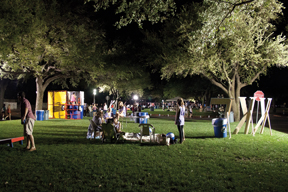
Adolescents and young adults are diagnosed with a form of cancer 72,000 times per year. That’s one diagnosis every eight minutes. Annually, 10,000 young adults die from cancer. That’s one death every hour. Over the past 30 years, cancer in young adults has increased more than every other age group.
Those statistics are from the National Cancer Institute, as is this one: Cancer is now the No. 1 disease killer in young adults.
While many college students may know someone whose life has been changed by cancer, few are aware of the growth of the illness among people their age. That’s just another reason for students to get involved now in SMU’s yearly Relay for Life event, its
planners said.
To fight this epidemic on a community level, Southern Methodist University hosts a yearly Relay for Life event. This school year, SMU’s Relay for Life will be held April 5. According to the communications director for the event, Kelly Zitka, Relay for Life is SMU’s largest philanthropic event organized by students that raises money for the American Cancer Society. “It’s a 12-hour event to show that cancer never sleeps,” Zitka said.
Relay for Life involves over 4 million people across 20 countries to raise money and awareness for cancer. The American Cancer Society uses funds raised at events such as Relay for Life to help diagnose the cause of cancers, find ways to prevent it, and ultimately find a cure. Sophomore Amy Paschall attended last year’s Relay for Life on Bishop Boulevard. Her favorite part of the event was “seeing the whole SMU community come together for the cause,” she said. “We’re in a bubble at SMU — we don’t think about things in the outside world. Bringing Relay for Life to SMU reminded me that cancer is a real problem happening in the world.”
Though filled with 12 hours of fun, food, games and entertainment, Relay for Life focuses on three main goals: to celebrate, to remember and to fight back. Every Relay for Life event around the world is distinguished by these three distinct parts. The Survivor Lap at the beginning of the event is a celebration of all those who have beat cancer. The Luminaria Ceremony, toward the middle of the event, encourages participants to remember those who have lost their lives to cancer and those who are currently fighting cancer. Finally, the Fight Back Ceremony challenges participants to make their own personal commitments to fight back against cancer.
Zitka shared some of the new ideas that will be seen the next time Relay for Life hits the Boulevard. First, she hopes that next year’s Relay will include a team made up of SMU professors. Zitka also explained that next year’s Relay will be held on a Saturday from noon to midnight, rather than from 5 p.m. to 5 a.m. She hopes that the new Relay for Life will bring the feel of a “spring Boulevard for a cause.”
SMU students can get involved with Relay for Life now by starting a team, joining a team, setting personal fundraising goals and reaching out to people they know to help them reach those fundraising goals.
“Even students not a part of an organization can make a team to honor or support someone they know who has fought cancer,” Zitka said. “It really is for everybody.”
“The funds that can be raised by SMU Relay for Life change so many people’s lives, in ways that people may not know. It is important to take one night out of the year to support such an amazing cause,” Zitka said.
Thanks to fundraising events such as Relay for Life, over 600,000 young adult cancer survivors exist in the United States, and one in every 100 college students is a cancer survivor.
Audra LaCroix is a sophomore at the University of Texas at Austin who recently won her battle against Stage III Hodgkin’s lymphoma. LaCroix, who describes the day she was diagnosed as “the worst day of my life” and “the scariest thing I’ve been through,” reflects on her time as a cancer patient.
“I learned so much about myself during this time and I grew so much closer to my loved ones. As hard as it was, I would do it all over again for those reasons,” she said.
LaCroix was involved in Relay for Life during her middle school years and even attended a Relay for Life event this past spring, where she was able to participate in the Survivor Walk. “As a survivor, Relay for Life was an extremely emotional experience,” she said. “Although you have the support of your family and friends, having cancer is still very isolating, and at times, even lonely. Seeing all of the survivors together, all the people who had gone through what I went through, made me realize that I’m not alone,” LaCroix said.
LaCroix’s advice to other college students fighting cancer? “Stay positive,” she said. “Cancer is as demanding emotionally as it is physically…You may not be in control of the situation, but you are in complete control of your attitude…You have the power to turn the experience around and make it a positive, rewarding one.”








